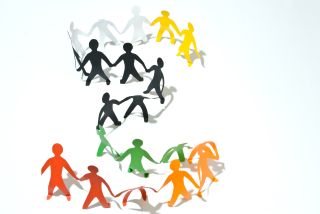Forgiveness
Is Forgiveness Against Our Human Nature?
The answer depends on what the essence of our humanity actually is.
Posted January 22, 2024 Reviewed by Michelle Quirk
Key points
- Forgiveness is criticized as much too mild a response to survival of the fittest, which might be our nature.
- If the essence of human nature is to be in community, then we need to find a way of reducing resentments.
- Forgiveness, as a scientifically supported way of reducing resentments, helps us live in harmony with others.
To answer our question, we need to ask a further question: What is the essence of our humanity?
For the sake of simplicity, we consider two distinctly different views of humanity, both of which involve ideas from biology and philosophy.
First View

The first view involves dominance and power. Charles Darwin, for example, argued that we are biologically programmed for the quest of the survival of the fittest. As individuals stand higher in the dominance hierarchy than others, then they are more likely to pass their own DNA to the next generations. In philosophy, Nietzsche (1887) continues this theme with his argument that humanity has a quest for power, similar to the biological idea of dominance over others.
From the ideas of this first position, in an early doctoral dissertation on the psychology of forgiveness, Droll (1984) made the intriguing claim that humans’ essential nature is more aggressive than forgiving allows. Those who forgive are thwarting their basic nature, much to their detriment. From this position, science would expect that forgivers are compromising their well-being as they offer mercy to others, who might then take advantage of them.
Second View

The second view involves the theme of cooperation, mutual respect, and even love as the basis of who we are as humans. Within biology, almost a half-century ago, E.O. Wilson (1975) described what he called sociobiology, or the concept that to survive well, we have to live in cooperative communities with one another. In other words, dominating others could alienate those others, with the result of hostility within families and communities. Such hostility could hurt both the systems in which the hostility occurs as well as the individuals who practice the hostility and those individuals who are the recipients of the hostility. In philosophy, as just one example, we find Kant’s (1785) theme that all people are ends in and of themselves and should be treated as such. In other words, we strive in a moral sense not to dominate others.
For this second view within psychology, we see the theme of love, in the sense of serving others, in the work of Lewis, Amini, and Lannon (2001). They present the scientific argument that to flourish as human beings, we need both to receive love from and offer love to others. Because love is so important to every one of us, we often experience anguish when others withhold their love from us. The more that love is taken away, the more suffering someone may experience. The road to healing may take longer the longer and more intensely that love is withdrawn. Without love, our connections with a wide range of individuals in our lives can fall apart. From E.O. Wilson’s perspective, this can damage harmony within communities, which is the point of our survival as a species.
Is Forgiveness Against Our Nature?
From this second viewpoint of who we are as humans, forgiveness plays a key role in the biological and psychological integrity of both individuals and communities because one of the outcomes of forgiveness, shown through scientific studies (Enright & Fitzgibbons, 2015), is the diminishing of hostility and the restoration of harmony. Forgiveness can break the cycle of anger and even revenge. At least to the extent that the people from whom you are estranged accept your love and forgiveness and are prepared to make the required adjustments, forgiveness can heal relationships and reconnect people.
Which of These Two Approaches Seems More Correct?
Given that dominance and a lack of respect and a lack of forgiveness can compromise a person’s psychological and relational well-being, the first approach does not seem viable as a way to live. Given that forgiveness has been shown in numerous studies to enhance well-being, it follows that the second approach seems more valid, both from the reasoning of philosophy and the supported hypotheses from social science. Even common sense strongly suggests that the will to power over others does not make for harmonious interactions. For example, how well has slavery worked as a mode of social harmony?
Forgiveness is not against our nature. Instead, forgiveness is part of that nature when we see that we need to live in community and love those who are close to us in that community.
As an important caveat, when we take a Classical Realist philosophical perspective, that of Aristotle, we see the distinction between potentiality and actuality. We are not necessarily born with the capacity to forgive, but instead with the potential to learn about it and to grow in our ability to forgive. The actuality of forgiving, its actual appropriation in conflict situations, develops with practice.
Do you see how forgiveness safeguards both your humanity and that of others? This is the case because one way to reclaim the love that has been taken from you by the unfair deeds of others is by forgiveness. This will enable you to feel love again and be more receptive to love from others in the future. When you demonstrate greater love to others, you give them the opportunity to learn about forgiveness, put it into practice, and find a way to end the destructive effects of resentment in their own relationships and communities.
In Conclusion
When we see the essence of humanity through the lens of sociobiology, Kantian philosophy, and social science, the conclusion is this: Not only is forgiveness consonant with our nature but also it may be one of the elements that helps humanity to survive, especially in an age in which the proliferation of nuclear weapons, when used to dominate others, could exterminate communities of persons and even humanity itself.
If forgiveness is part of our human nature but must be cultivated through thought and practice, then why do almost all societies on planet Earth spend so little time thinking about and deliberately practicing forgiveness within their own families and communities? What has prevented this? If E.O. Wilson is correct, that we are better off when living in cooperative communities, then we need to find a way of making forgiveness a natural part of our lives and our communities for the good of humanity.
References
Droll, D.M. (1984). Forgiveness: Theory and Research. Doctoral dissertation, University of Nevada, Reno.
Enright, R.D. & Fitzgibbons, R. (2015). Forgiveness Therapy. Washington, DC: APA Books.
Kant, I. (1785/2009). Groundwork of the Metaphysics of Morals. New York: Harper Perennial Modern Classics.
Lewis, T. Amini, F., & Lannon, R. (2001). A General Theory of Love. New York: Vintage.
Nietzsche, F. (1887/2014). On the Genealogy of Morals. New York: Penguin Classics.
Wilson, E.O. (1975). Sociobiology: The New Synthesis. Cambridge, MA: Belknap Press.




